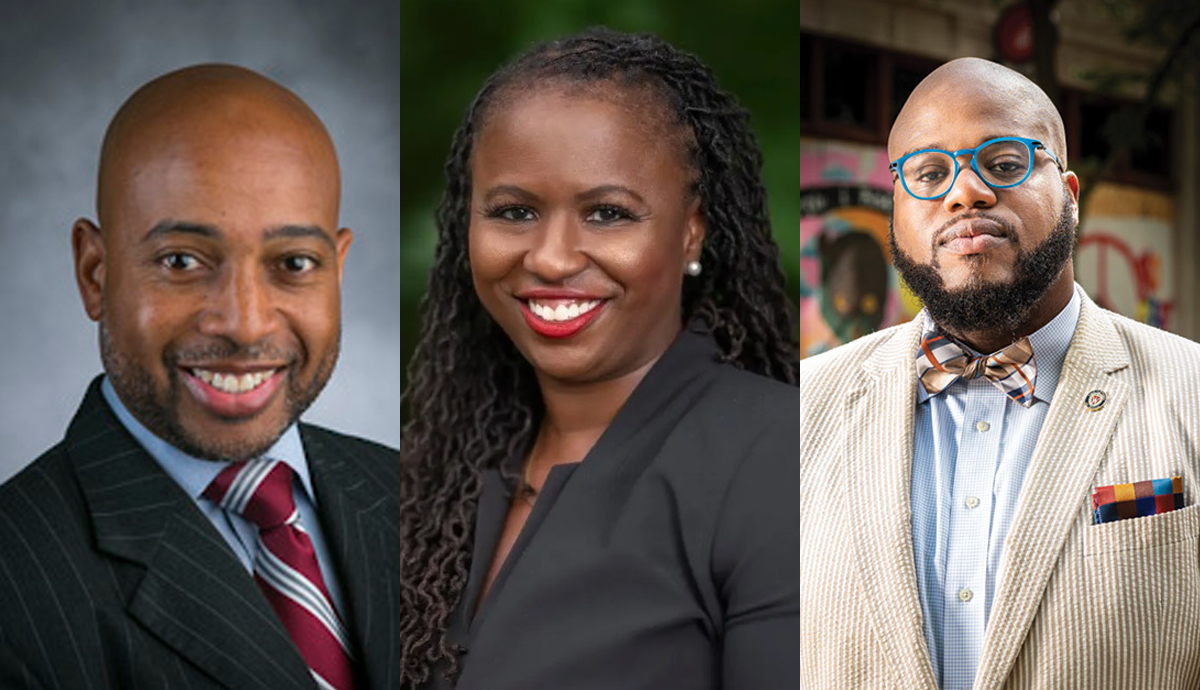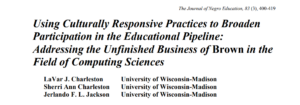
They were caught trying to pass off old data as new research.
Experts say that’s fraud.
LaVar Charleston is still UW-Madison’s top diversity official.
UW-Madison has initiated its “Misconduct in Scholarly Research” policy.
Jan. 31, 2024
By Bill Osmulski
The latest plagiarism scandal at Harvard University has implicated one current and two former diversity officials at the University of Wisconsin-Madison.
LaVar Charleston is UW-Madison’s current Deputy Vice Chancellor for Diversity & Inclusion, Vice Provost and Chief Diversity Officer. He is married to Sherri Ann Charleston, who is Harvard’s Chief Diversity and Inclusion Officer. Sherri Ann had also previously worked as a diversity official at UW-Madison before getting the job at Harvard in 2020. This week, she was accused of committing plagiarism throughout her academic career. Her husband, LaVar, allegedly helped her to commit fraud at least one of those times in a 2014 study.
Another former diversity official from UW-Madison, Jerlando Jackson was also listed as a co-author of the study in question. Jackson was UW-Madison‘s Director & Chief Research Scientist, Wisconsin’s Equity and Inclusion Laboratory. He was hired as the Dean of the College of Education at Michigan State University in 2022.
All three individuals were with UW-Madison at the time the article was published.

Copy and Pasting Old Data into a New Study
Sherri Ann Charleston, LaVar Charleston, and Jerlando Jackson wrote an article for a peer-reviewed journal in 2014 about the barriers African Americans face when pursuing STEM degrees. It was the only peer-reviewed article Sherri Ann ever wrote, and it’s apparently plagiarized from LaVar’s earlier research.
The 2014 study used the same interview responses LaVar collected in a 2012 study to identify factors that impact African American’s success in pursuing computer science degrees. LaVar interviewed 37 individuals for that study. Jerlando, LaVar and Sherri also claimed in their 2014 article to have interviewed 37 individuals, whose demographics were identical to the those in the 2012 study. Both articles described the group as 22% undergraduate students, 48% graduate students, and 30% PhDs; 50% were at predominantly white schools, 42% were at historically black institutions, and 8% were at predominately black schools. The coincidences did not stop there.
These were qualitative studies, so it was important to include direct quotes from the interviews in the articles. Several identical responses appeared in both articles verbatim. Although LaVar’s 2012 article was cited several times in the 2014 article, there was no mention that the data used in the 2014 study was the exact same data collected for the 2012 study.
Exposing the Fraud
This was all revealed in an anonymous complaint sent to Harvard, the University of Michigan, the University of Wisconsin – Madison, and the Washington Free Beacon. The Washington Free Beacon broke the story on Jan. 30th and interviewed several academic experts who agreed that the three individuals committed academic fraud by trying to pass off the old data as new research.
“This does have the earmarks of plagiarism, but the plagiarism is compounded by an even larger effort to deceive,” Peter Wood, the head of the National Association of Scholars, told the Washington Free Beacon about the article. “This is research fraud pure and simple.”
Several others agreed with that assessment, stating that the schools and journals need to conduct an investigation.
Previous MacIver News Coverage of LaVar Charleston
LaVar Charleston’s name will be familiar to MacIver’s followers. The MacIver News Service has reported about his radical activities over the past several years.
In 2021, Charleston led an anti-racism workshop for teachers in the Madison Metropolitan School District (MMSD). Teachers teaching too much, time schedules, using the word student, or simply being boring were all identified as examples of white supremacy in the classroom.
MacIver also found that LaVar Charleston has a violent past. He was arrested in 2011 for the “strangulation and suffocation” of a Madison police officer and for domestic disturbance before that. He was released into the First Offenders Deferred Prosecution program.
UW-Madison’s Response
UW-Madison told MacIver News that LaVar Charleston is “a noted leader on campus and scholar in the education field, with research focused on access and inclusion in STEM.”
However, the school takes the allegations seriously, and it has already begun the process of determining whether LaVar Charleston had committed “misconduct in scholarly research.” The first step, which is underway, is an assessment to determine whether “the allegation meets the definition of research misconduct,” according to the University’s official policy. That process should take one week.
Afterwards a panel of experts will determine if further investigation is needed. That should take less than 60 days. Next, a committee will have four months to conduct the investigation. Then, within in 20 days of the investigation’s completion, the provost will review the findings and determine what actions the school should take. That could involve firing him. If the process gets this far and determines that misconduct occurred, Charleston would have 4 months to appeal.
The whole process, from beginning to end, could take up to 11 months, and extensions are available.
Harvard’s Other Recent Plagiarism Problems
The accusations against Charleston come on the heels of another plagiarism scandal at Harvard that broke in January involving its president.
Claudine Gay was Harvard’s first black president. She faced pressure over outbursts of antisemitism on campus following the Oct. 7th terrorist attacks in Israel, and then it was uncovered that she had plagiarized about 50 times throughout her academic career. She resigned in disgrace on Jan. 2nd. She blamed racism for her removal.